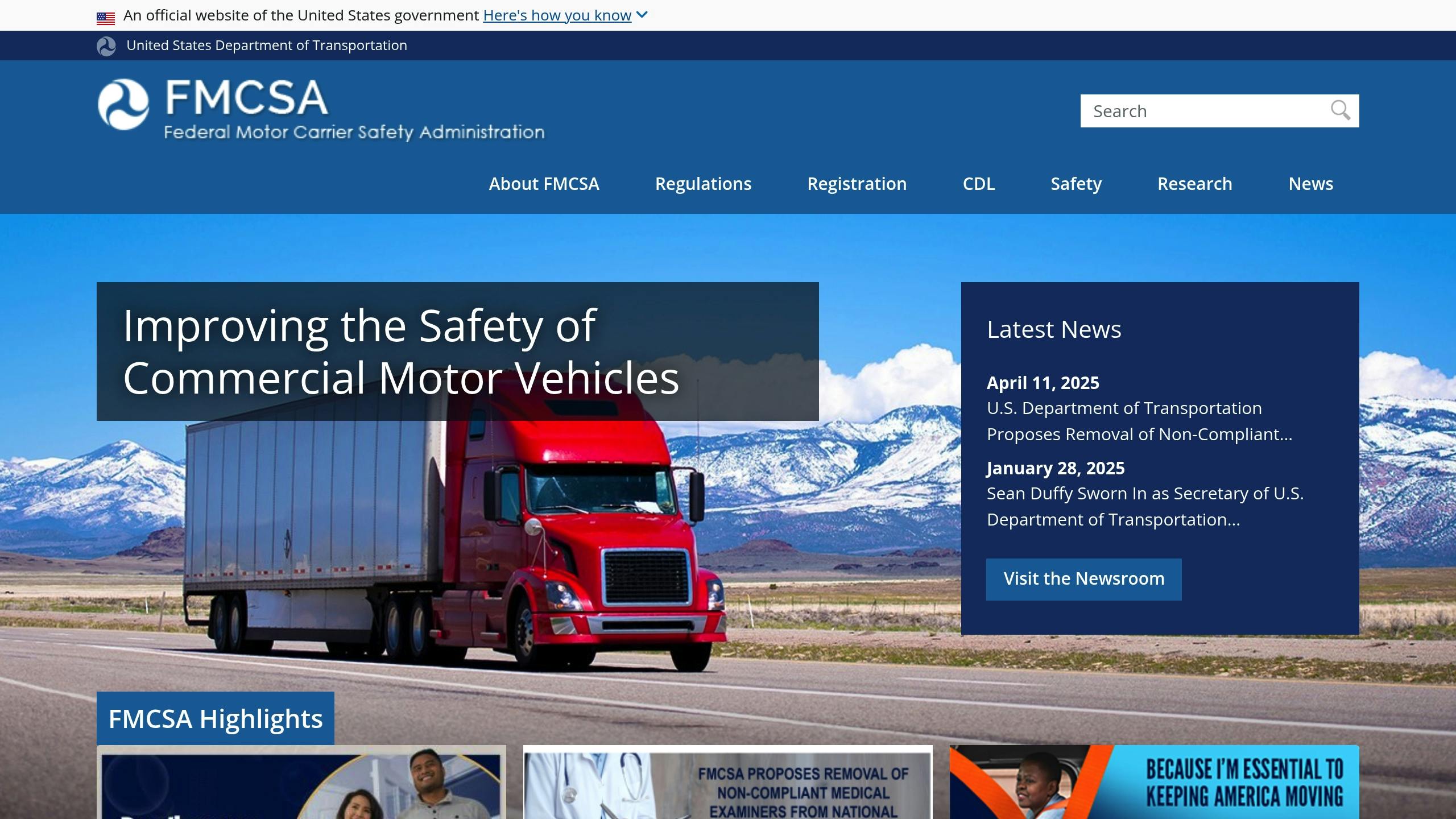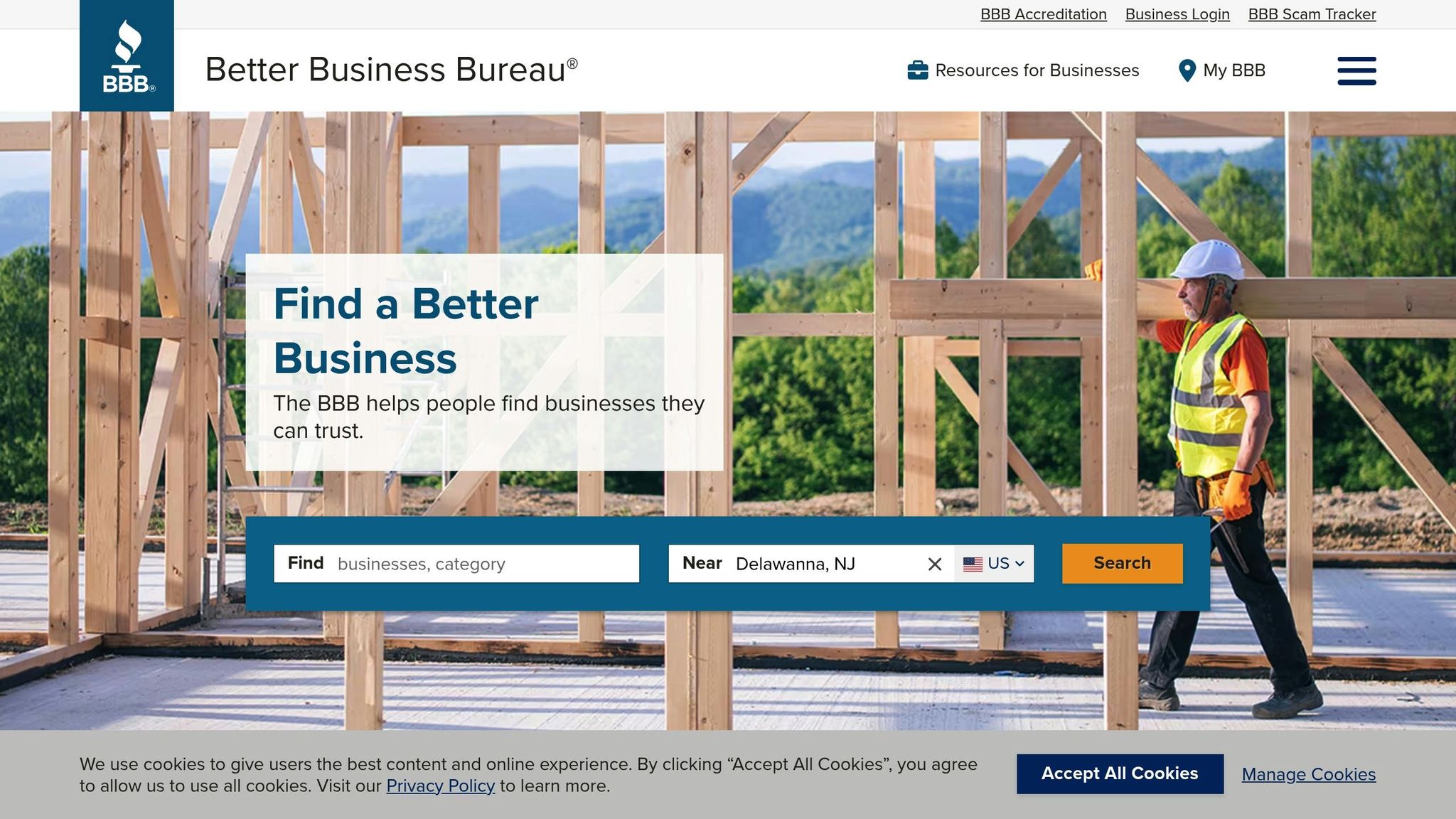How to Report Moving Insurance Violations

Reporting moving insurance violations can protect your rights and ensure companies are held accountable. Here's a quick guide to get started:
- Common Violations: Misleading coverage, lack of required insurance, delayed claims, unjust denials, and missing paperwork.
- Key Steps:
- Contact your moving company in writing with a formal complaint.
- File a complaint with the FMCSA via their National Consumer Complaint Database.
- Report to your state’s consumer protection agency or insurance commission.
- Submit a complaint to the Better Business Bureau (BBB).
- Explore legal options if the issue remains unresolved.
- Documents to Gather: Moving contracts, insurance policies, damage evidence, communication records, and payment proofs.
For interstate moves, movers must meet FMCSA insurance requirements, including $750,000 in public liability coverage. Knowing your rights and keeping detailed records is crucial for resolving disputes effectively. Use platforms like MOD24 to verify movers' insurance and licensing before hiring.
How to Deal with Damage Claims from Moves
Moving Insurance Violations Explained
Moving insurance violations happen when moving companies fail to meet their legal responsibilities for coverage and handling claims. Knowing what these violations look like can help you decide when to take action.
Common Insurance Violations
Here are some frequent issues movers might run into:
- Misleading Coverage: Claiming to offer full-value protection but only providing basic liability (e.g., $0.60 per pound per item).
- Lack of Insurance: Operating without the required $750,000 in public liability coverage.
- Claims Delays: Taking longer than the 120-day limit to process claims.
- Unjust Claim Denials: Denying claims based on exclusions that aren't clearly listed.
- Paperwork Problems: Failing to provide written proof of coverage or explain available insurance options.
FMCSA's Role in Moving Insurance

The Federal Motor Carrier Safety Administration (FMCSA) plays a key role in keeping movers accountable. They oversee moving company insurance by:
- Setting minimum insurance requirements for interstate movers.
- Keeping public records of insurance certificates.
- Investigating complaints from consumers.
- Issuing fines of up to $25,000 per violation.
- Revoking operating licenses for serious offenses.
To comply with FMCSA rules, all interstate moving companies must have the following insurance:
| Insurance Type | Minimum Coverage Required |
|---|---|
| Public Liability | $750,000 |
| Cargo Insurance | Varies based on vehicle weight |
| Environmental Restoration | $5,000 |
If you suspect a violation, you can report it through the FMCSA's National Consumer Complaint Database (NCCDB). This system helps track patterns of misconduct and can lead to investigations when needed.
Getting Ready to Report
Before filing your complaint, gather all necessary details and documents. Keeping your records well-organized can help speed up the process.
Information You’ll Need
Here’s what you’ll need to have on hand:
-
Company Details:
- Legal business name
- USDOT number (usually on the truck or contract)
- MC number (Motor Carrier number)
- Business address
- Contact details
-
Move Information:
- Date of the move
- Pickup and drop-off addresses
- Total charges
- Type of insurance purchased
- Claim amount (if applicable)
- A clear description of the issue
-
Your Information:
- Full name
- Current address
- Phone number
- Order or tracking number
Documents to Prepare
| Document Type | What to Include | Format Needed |
|---|---|---|
| Moving Contract | Signed agreement | PDF or clear photos |
| Insurance Policy | Coverage details | Original document |
| Damage Evidence | Date-stamped photos/videos | Digital files |
| Communication Records | Emails, texts, call logs | Screenshots/transcripts |
| Payment Records | Receipts, bank statements | PDF or clear photos |
| Claim Documents | Claims and responses | Original paperwork |
To ensure your evidence is usable, make sure documents are:
- Easy to read
- Properly dated
- Arranged in chronological order
- Digitally saved
- Backed up in multiple locations
Also, keep a detailed log of all interactions with the moving company. Include representative names, dates, conversation summaries, and any promises made. Keep both original and digital copies of everything.
Once everything is organized, you’ll be ready to move forward with the reporting process.
5 Steps to Report Insurance Violations
Follow these steps to report moving insurance violations through the proper channels. Make sure you have all your documentation ready before proceeding.
1. Contact Your Moving Company
Start by reaching out to your moving company in writing. Here's how:
- Send a formal complaint via certified mail.
- Include your policy number and a clear explanation of the issue.
- Request a written response from the company.
- Keep copies of all communications for your records.
2. File a Complaint with the FMCSA
Submit your complaint to the Federal Motor Carrier Safety Administration (FMCSA) using their National Consumer Complaint Database:
- Go to the FMCSA website (protectyourmove.gov) and find the online complaint portal.
- Fill out the complaint form, providing all required details and identification numbers.
- Attach supporting documents to back up your case.
- Save the complaint number for follow-up.
3. Contact State Agencies
If the issue remains unresolved, escalate it to your state's consumer protection agency or insurance commission. Ask about the process for filing a report on moving insurance problems. Be prepared to provide:
- Your moving contract.
- Insurance policy details.
- Records of communication with the moving company.
4. Report to the Better Business Bureau (BBB)

File an online complaint with the BBB. Include a detailed timeline of events and any supporting evidence. If this doesn't resolve the issue, you may need to consider legal options.
5. Explore Legal Options
If all else fails, your detailed records can help with legal or mediation efforts. For smaller claims, small claims court may be an option. For larger disputes, consult an attorney who specializes in transportation or consumer law.
- Document damages with photos and receipts.
- Consider mediation as a less formal alternative to litigation.
- Be aware of your state's deadlines for filing insurance claims, as these vary.
These steps can help you address insurance violations effectively. Up next, we'll dive into the specifics of moving insurance laws.
sbb-itb-290b89d
Moving Insurance Laws
Understanding the basics of federal moving insurance rules is essential when dealing with insurance issues. These regulations establish minimum protections for consumers during interstate moves.
Insurance Coverage Types
Federal law mandates two main types of liability coverage for moving companies:
| Coverage Type | Protection Level | Cost | Key Features |
|---|---|---|---|
| Full Value Protection | Covers up to 100% of the item's value | Additional fee based on value | • Full compensation for lost or damaged items • Options: repair, replacement, or cash payout |
| Released Value Protection | Limited liability based on weight (e.g., cents per pound) | Included in basic moving cost | • Minimal protection • No extra cost • May not fully cover high-value items |
Movers are required to provide a written explanation of these options before your move. This information will appear in your moving contract and estimate, ensuring you’re informed about your choices. Understanding these options helps you make better decisions about protecting your belongings.
Your Legal Rights
The Federal Motor Carrier Safety Administration (FMCSA) ensures that interstate movers must provide customers with the "Your Rights and Responsibilities When You Move" booklet. This document outlines important details like:
- Your right to receive written estimates
- The mover's liability for loss or damage
- Claims processes and deadlines
- Dispute resolution options
Make sure you receive:
- A detailed written estimate
- A clear breakdown of your insurance options
- A copy of the "Rights and Responsibilities" booklet
- Proof of the mover’s insurance coverage
If a moving company doesn’t provide these documents or misrepresents its insurance, it’s a violation you can report. Additionally, some states may have extra insurance requirements for intrastate moves, so it’s important to check both federal and state rules before moving.
Making Your Complaint Count
To improve your chances of resolving a dispute and encouraging a proper investigation, it's important to present your case clearly and with solid evidence.
Keep Detailed Records
Gather and organize every piece of information related to your move. Here's what to focus on:
- Written Communications: Save emails, text messages, and any other correspondence with the moving company.
- Phone Calls: Note down the date, time, and name of the representative for every call.
- Photos and Videos: Take clear pictures or videos of your belongings before they’re loaded and after delivery.
- Official Documents: Hold onto key paperwork like your moving contract, bill of lading, insurance certificates, estimates, and inventory lists.
Arrange everything in order of events and store copies both digitally and physically. This way, you’re prepared to back up your claims when submitting your complaint.
Report Through Multiple Channels
Once your documentation is ready, send your complaint to all relevant organizations. This could include the FMCSA, your state agency, and the Better Business Bureau (BBB).
Stick to the facts and use the same set of documents for every submission. Stay professional in your tone, keep track of complaint numbers, and include reference numbers if you're following up on earlier reports. This ensures your complaint is reviewed thoroughly across all platforms.
MOD24's Moving Protection

MOD24 helps protect customers by ensuring movers have valid insurance and proper licensing. This reduces potential risks and makes the moving process smoother and safer.
How MOD24 Works
MOD24 provides several layers of protection through its verification system:
- Insurance and Licensing Checks: Ensures movers have the required insurance and licenses.
- Real-Time Updates: Access the latest insurance status, license details, live reviews, and estimated rates.
- Dedicated Support: If issues arise during your move, MOD24's support team is available via chat to help with changes, cancellations, or rescheduling.
Booking Through MOD24
Here’s how you can book your move using MOD24:
- Enter your move details, including the date, size, and locations.
- Review detailed information about each mover.
- Read current customer reviews and check ratings.
- Confirm the insurance certificates displayed.
- Save copies of all provided documentation for your records.
Summary
Reporting moving insurance issues correctly is crucial for protecting your rights and resolving disputes. The Federal Motor Carrier Safety Administration (FMCSA) monitors moving company insurance compliance, so keeping proper documentation and reporting violations is key.
Here's a quick recap: document all communications, gather evidence, maintain thorough records, file complaints with the FMCSA and relevant state agencies, and consider legal action if necessary. These steps help safeguard your rights and encourage regulatory enforcement.
MOD24 simplifies this process by offering verified insurance details, live customer support, and comprehensive mover documentation. Their platform ensures that listed movers have valid insurance and licensing, while also providing additional coverage options and dedicated support for insurance-related questions.

How Survivors of Domestic Abuse Can Move On
Everyone has the right to live a life free from fear and violence, but deciding to leave an abusive ...

How to Pack China for Moving - The Best Way to Protect Dishes
Packing up a home is all fun and games until it's time to deal with the expensive, fragile things. P...

Is Seattle a Good Place to Move?
We all know the wonders of the Emerald City, from the vast cultural offerings that Seattle has to it...